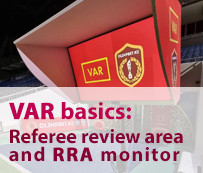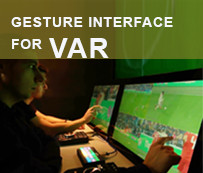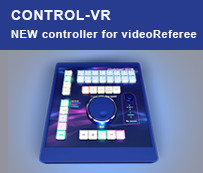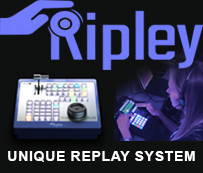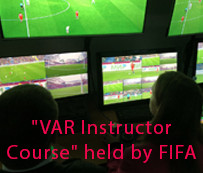The workshop on video replay experiments was held in Amsterdam, the Netherlands, 18-20 May 2016
The International Football Association Board (IFAB) has invited tournament organizers interested in running experiments with Video Assistant Referee (VAR) to see the technology in action.
As an established and experienced VAR technology provider with over 70 installations in sports arenas around the world, SLOMO.TV participated in the IFAB tests with the videoReferee® 12-channel system that was used for the demonstration as a real working VAR system.
Please read the comments on the workshop from the IFAB and FIFA representatives below.
Lucas Brud,
Secretary of the IFAB:
The IFAB decided to allow experiments with video assistant referees in order to be able to answer one main question, and this is: "Will this support help the referees or not, and will it bring more fair play to the game?" Some theories may say "yes", but we really have to test live in order to be able to answer this question.
In the lead up to the decision, we have involved several football stakeholders, players, coaches, panels that advise us in football and in technical matters.
Also we have spoken to other sports such as NBA, NFL, cricket, rugby who have helped us establish the protocol for football. Even though it sounds like a different sport there are lots of parallels when it comes to video system referees (VAR).
The four match-changing decisions that IFAB has identified are: a goal or anything that leads to a goal, for example, foul play, a handball, or an offside situation; then a penalty, anything that might lead to a penalty kick, such as a foul, and, again, a handball [situation].
The referees may also review whether the foul or the handball happened outside or inside the penalty area.
And the third – a very important one – is direct red-card incidents.
We are not talking about a second yellow card, a direct red card, for example, for serious foul play or for violent conduct.
And the fourth more administrative decision is the award of a yellow card or a red card to the wrong player, we want to ensure that the players are not… that the right players are sanctioned.
Johannes Holzmüller,
FIFA Head of Football Technology Innovation:
As a member of the IFAB, FIFA was involved in the entire developing process from the beginning, and FIFA's football technology innovation department supports the IFAB with the management of the experiment and develops technological requirements to make sure that the video system referee receives the best view angles in the fastest possible time.
This project is similar to the goal-line technology because also in this project we are working with technology providers, we are working with research institutes in order to provide the IFAB for a final decision on video assistant refereeing (VAR) with all the facts and figures in order that they can make the right decision in the end.
Lucas Brud:
More than 25 associations and leagues have contacted us as they are interested in this discussion and want potentially to participate in the experiments. The IFAB will not decide which competitions will run the experiment, it would be rather the other way around. There would be requirements and protocols that the associations will have to fulfill in order to be able to participate in the experiments. We are currently conducting workshops after which we expect the associations, leagues, competition organizers to then confirm whether or not they want to participate, and once that is completed we will then start experimenting.
The expected decision to be taken earliest in 2018 or potentially even 2019 once the experiments are concluded and the analysis is available to the IFAB to take this important decision.
Check out the video from the workshop at the following link:




